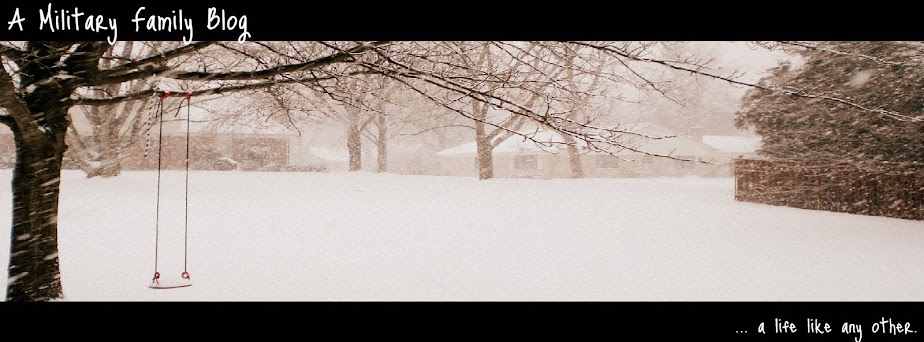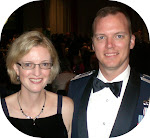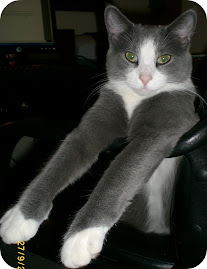This evening Olivia and Sean-Peter and I were looking at an "I Spy" book before bedtime, taking turns picking something we spy for the others to find. Every time it was Sean-Peter's turn,
"I spy... a blue airplane!" and no matter how big or how blue that airplane, and no matter how fiery a trail his eyes (and sometimes his finger) were blazing right to it, we had to try really hard not to "spy" it right away lest we incur his wrath.
"NO! NOT YET! YOU HAVE TO WAIT!" Pause.
Silence.
"Now...let me give you a hint..."Even Olivia played along. And as soon as someone was permitted to spy it -- EVERY TIME -- Sean-Peter would exclaim,
"Ah, you STINKER!"*********************************************
Just a few months ago Sean-Peter's "I spy" came out "I 'py". And his "stinker" was a "'tinker". A few months before that he had maybe a dozen words that he opened his mouth for consistently, not all of them intelligible to the unfamiliar ear. A few months before
that -- less than a year ago -- his speech was almost completely unintelligible. If you could even call it speech. A typical sentence went something like,
"Mm-mm-mm-mm-BAP!"My biggest complaint, which isn't really a complaint, is that no one meeting Sean-Peter for the first time believes me when I tell him them that he's
apraxic. His teachers? and his therapist at the school? They're all new to him this year, which has not been a problem at all, no sirree, not so far as his progress goes. Because progress he continues to make and mucho-much of it is thanks to them, so
Thank You Professionals because truly these women are angels from heaven who certainly only contribute to helping this little miracle on earth.
But apraxic? They don't believe it, not for a minute.
"Children with apraxia don't progress this quickly..." is all I've heard, aside from the barely refrained laughter. I in turn refrained from pressing the point. Because really, what is the point? He's getting the help he needs, and he's responding to it beautifully. If my only complaint is that no one will believe me that he's apraxic, well ... isn't that about the best thing I could ever hope to hear?
He's a poster child for early intervention, is what he is. It's not like I made the whole apraxia thing up, after all. I heard the word at his speech assessment for the first time myself exactly one year, one month, and one week ago -- not that the date is emblazoned on my brain or anything. He had just turned three. It took almost four more months for him to be officially diagnosed at Dayton Children's Hospital by a seasoned pathologist, one who has worked with apraxic children for "a very long time" (her response when I asked her how many years they've been diagnosing and treating children with this).
"A verbal apraxia (motor planning problem) is apparent." It's all there in black and white.
Within months of starting private speech therapy Sean-Peter was opening his mouth for sounds I'd never heard come out of his mouth before. I always used to say that he "swallowed" his words, but I learned from the professionals that what you heard was called hypernasality, or
velopharyngeal incompetency. The pathologist who diagnosed him said that hypernasality is rather common with apraxic children, but she had never heard a case so severe. (That just sent warm fuzzies down my spine I tell you what. I just wanted to lean over and kiss her.)
I've written about Sean-Peter's private speech therapist before, calling her
"The Speech Whisperer" so amazing has been her ability
at every session to get him to produce new sounds. Melissa has always said that Sean-Peter is very "stimulable" -- and he is. But sitting there session after session, witnessing how much she is able to pack into 30 minutes, it is just amazing.
And being able to view the sessions to learn the techniques myself allowed me to stretch the lessons into our routine at home. I know many mothers will sit down with their wee ones for a full-on speech therapy session at home once or several times a week. But for us I found that it was easier, more natural, and very effective to incorporate the visual cues I learned from Melissa during our everyday speaking throughout the day.
Back when he used to keep his mouth closed, if Melissa had worked on getting him to emit the "ee" sound that week, for instance, every time Sean-Peter would say a word with that sound I would cue him to open his mouth by using the technique I had just learned from his speech session. I did that sound, for example, first by having him look at me while I pointed to both of my cheeks with my fingers while opening my mouth wide. Eventually I cued him by pointing to just one cheek. Then if he was close by but looking at something else I would sometimes lightly tap the side of his cheek. Eventually all he needed was a verbal reminder,
"Let's say that again, buddy."All of this progress was often done by the time we were ready to go back the next week for his next session. This is
not normal, I do by now recognize. It's no wonder that a professional meeting him today cannot believe he was ever apraxic. It's a plain miracle, is what it is. He's amazing.
Not that we're done jumping hurdles, by any means. But the hurdles are much,
much closer to the ground.
After Sean-Peter started school again and I told Melissa about the feedback I received from his teachers and therapist there, she almost started to question the diagnosis herself. Even before that, during the summer when I would ask her,
"If you were to meet Sean-Peter for the first time today, would you still believe he was apraxic?" And she would say yes ... but then always qualify it by saying
apraxic children don't usually progress so quickly.
By last August, Sean-Peter was speaking so well and was rarely, if ever, reverting to speaking with that hypernasal way of his that used to be so familiar. But the pacing of his speech, his
prosody, was very effortful and choppy; his speaking lacked fluidity -- it still does. And one thing he had never been able to do was sing.
I'm not talking about
singing like he couldn't carry a tune and his voice would make a dog cry or anything like that. He's always been able to
hum (which doesn't require opening your mouth) as the day is long. I'm talking about singing the lyrics, the
words, to a song he might hear from his sister 50 times a day. Like the "ABC" song or "Old McDonald". The kid can carry a tune, I'll warrant that. But he couldn't spit the words out in time to a rhythm to save his life. In fact, I couldn't even get him to try. Cue professionals.
So Melissa decided to work on a song, starting with "Old McDonald". This was in August. It became clear rather quickly that this was
extremely difficult for him. It was the most frustrated I'd ever seen him with her and the first time he was drawn to tears. She simply worked with him to say, "Ee-i-ee-i" without breaking between the two sounds. He tried over and over again, with the same result. "Ee. i. ee. i." Oh, it was painful.
And now? Well! Did I ever mention that his preschool teacher used to train as an opera singer? (For real!) Her teaching incorporates
sooooo many songs throughout their class time I would be very hard-pressed to try to remember them all. It has been invaluable and came at the absolute most perfect time for him. And yes, he is
singing. My heart just jumps when I overhear him mindlessly singing a tune, albeit a bit choppy, whether it's one from his class or one he hears a million times from his musical sister. He'll even get goofy and make up his own lyrics like his brother and sister are wont to do. And to think, a mere five months ago the struggle to link together "Ee-i-ee-i" brought him to tears.
Shortly before the holidays, Melissa invited another speech therapist in to observe the last five minutes of his speech session. She basically just asked Sean-Peter a question to get him talking. She wanted the other pathologist's opinion and purposefully hadn't given her any of his background information.
This time was so short, but it provided me with so much information that will help me to continue to help my son. After maybe two minutes, tops, of listening to him prattle on about something that his dad had done (he totally ratted him out on something and it was so funny, but darned if I can remember what it was now) the other pathologist remarked that in addition to some articulation errors (a very common
developmental delay) she thought it seemed like he was having to almost search for the next word he wanted to say. But it wasn't -- this was key -- like he didn't know
what he wanted to say; rather, he was groping for the right way to say the word, for the proper sequencing, as they call it. In other words, he appeared to be struggling to just spit it out.
This is telling, because for someone who isn't a professional speech pathologist or who isn't intimately familiar with my son, it might be very easy to think that he is having a language issue rather than a motor planning problem. In other words, they might think he's having trouble understanding the question rather than just having to work harder at voicing the answer.
I think about when it comes time for him to start kindergarten, these are the kinds of things that I will need to be aware of for helping him transition into a classroom with a new teacher who will have a room full of kids and not the time necessary to figure stuff out like this on her own. Or at least not right away. This is the kind of information that will help her to understand a child like mine, who may still have lingering effects of this apraxia as it effects his speech and his ability to
just spit it out. Once upon a time I wasn't even sure if he would be able to attend kindergarten, so uncertain was his future in mainstream education. Now his progress seems endless and our options wide open. Label it what you want, I know a miracle when I see one.
 Shoveling supervisor
Shoveling supervisor Snow Angel
Snow Angel Icicle Cane
Icicle Cane Practicing Her Own Preaching
Practicing Her Own Preaching Rosy Cheeks and Red Mittens
Rosy Cheeks and Red Mittens Van Ice
Van Ice All Tuckered Out
All Tuckered Out





























